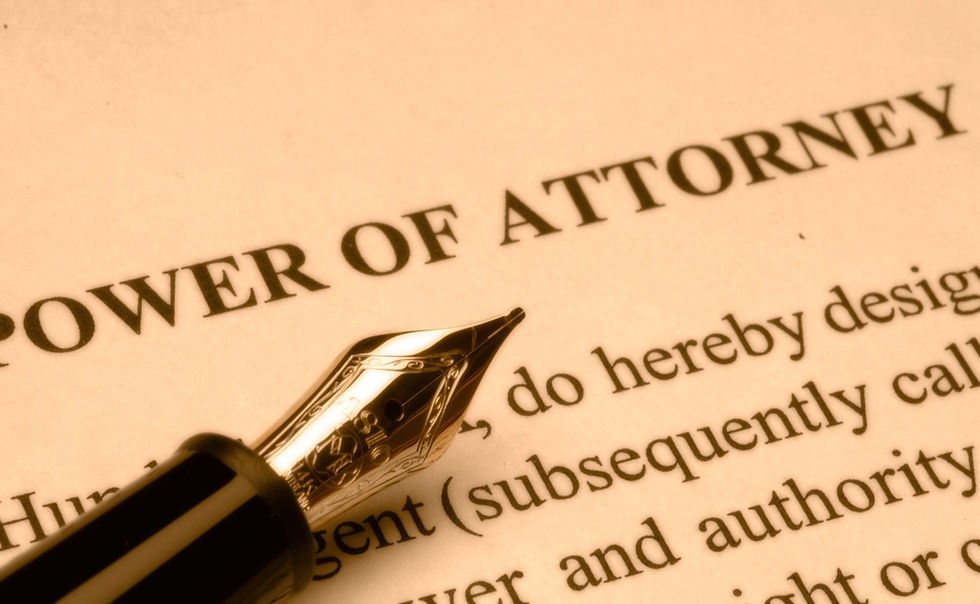Wills & Powers Of Attorney - Time to Face Facts
- Peter Middleton
- Jun 27, 2020
- 3 min read
Updated: Dec 26, 2020

Once you or a loved one is diagnosed with dementia, there are some hard discussions to be had.
All of the awkward conversations you’ve been putting off for years need to be aired and discussed, and there are vital things that need to be taken care of to secure the future and enable you to live more easily and worry free.
The bottom line is that You need to make a Will and a Lasting Power of Attorney (LPA)
Drawing up an LPA and a Will protects your money if you fall ill or lose mental capacity, and in the event of your death. Writing these documents is an important consideration at any age, but it becomes more so as you get older - a time when your health may be more likely to fail, and is really a necessity when diagnosed with dementia.
Firstly, you’ll need a Will. Wills contain instructions on how your money should be distributed when you die.
What is a Will and why do I need one??
You need a Will because you are an individual with possessions, and possibly heirs, that are important to you. You need a Will because you want to protect them and their best interests.
Wills contain instructions on how your money should be distributed when you die.
Some people think that only the very wealthy or those with complicated assets need Wills. However, there are many good reasons to have a Will.
You can be clear about who gets your assets. You can decide who gets what and how much.
You can keep your assets out of the hands of people you don't want to have them (like an estranged relative).
You can identify who should care for your children. Without a Will, the courts will decide.
Your heirs will have a faster and easier time getting access to your assets.
You can plan to save your estate money on taxes. You can also give gifts and charitable donations, which can help offset the estate tax.
In short, a Will allows you to decide in advance who will inherit your money and possessions. Making a Will helps you avoid inheritance tax, or reduce it - inheritance tax currently stands at 40% and applies to some deceased estates over £325,000.
You already have a Will? Well, now’s the time to dust it off and see if it’s still fit for purpose.
How do you make a Will?
You can ask a solicitor or professional Will writer to make your Will or you can do it yourself. Some charities also offer free or reduced cost Will-writing services in return for a donation, so this may be worth considering.
It’s sensible to seek professional assistance in drawing up your Will if your circumstances aren’t straightforward.
If you do decide to write your own Will, you can buy ‘blank' templates that provide simple guidance and example wording at stationery stores and online.
You’ll need to consider who to appoint as your Trustee(s) and who will inherit your money and possessions.
What is a Lasting Power of Attorney and why do you need one?
A Lasting Power of Attorney (LPA) is a document that appoints one or more individuals (attorneys) to make decisions and act on your behalf (the donor) in relation to your property, finances, health and welfare.
Should you suffer a stroke, lose mental capacity or experience a debilitating ailment, an LPA ensures important aspects of your life are taken care of by one or more individuals you trust.
Setting up a Lasting Power of Attorney
You can ask a solicitor to draw up these documents for you or set them up yourself. If you decide to set up a Lasting Power of Attorney yourself, you must be over eighteen and have the mental capacity to do so.
There are two types of Lasting Power of Attorney:
Property and financial affairs - Grants your attorney authority to make decisions concerning your assets and personal property.
Health and welfare - Lets your attorney make decisions about items like your daily living routine, moving into an extended care facility, or requesting aid from social services. You can also give your attorney the power to provide or withhold consent for life-sustaining medical treatment.
You can download the forms from the gov.uk website or complete them online. They must be registered with the Office of the Public Guardian before they can become effective, which currently costs £82 per document.
Useful links



Comments